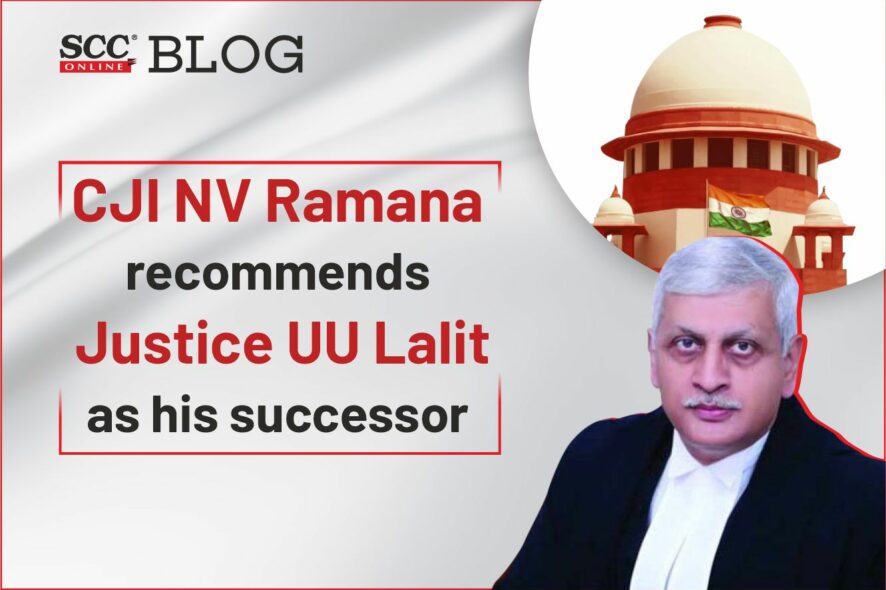The Chief Justice of India, Justice NV Ramana has named Justice Uday Umesh Lalit as his successor. Set to become the 49th Chief Justice of India, Justice Lalit will retire in November, 2022.
Justice Uday Umesh Lalit, was the 6th Senior Advocate to be directly elevated to the Supreme Court as a judge. As a senior advocate he specialised in criminal cases and was appointed as CBI’s Special Public Prosecutor in all 2G matters, under the Supreme Court’s orders.
Justice Lalit’s father, Justice UR. Lalit, was a former additional judge of the Bombay High Court, Nagpur bench. He joined the bar in 1983 and practiced as an advocate in the Bombay High Court from 1983 to 1985. In 1986, he joined the chambers of Former Attorney General for India, Soli Sorabjee from 1986 to 1992. In 2004, he was designated as a senior advocate and also served as a member of the Supreme Court’s Legal Services Committee for two terms.[1]
A DNA India report[2], described that his “strength as an advocate were his thoroughness with the case, patience in explaining legal questions and the sober demeanour in presenting the case before the bench”.
After become a Supreme Court judge in 2014, Justice Lalit has delivered 276 judgments[3]. Interestingly, Justice UU Lalit recused himself from the Ramjanmbhoomi-Babrui Masjid Land dispute, after it was pointed out that he had represented former UP Chief Minister Kalyan Singh, in a related matter.
One of the most important judgments delivered by the benches headed by him, is the POCSO skin to skin verdict, where he, along with Bela Trivedi (who authored the judgment) and S. Ravindra Bhat (who authored the concurring opinion), JJ, set aside the Bombay High Court (Nagpur Bench) judgment that had acquitted the accused under Section 8 of the POCSO Act, 2012 on the ground that no direct physical contact i.e. skin to skin with sexual intent without penetration would not amount to ‘sexual assault’. [Read: POCSO| “Touch”, “physical contact” can’t be restricted to “skin to skin contact”; “sexual intent” is the key. SC reverses Bombay HC’s “dangerous precedent”]
Recently, Justice Lalit headed the 3-judge bench that imposed sentence of four months and fine of Rs.2,000/- on Vijay Mallya for contempt of Court after observing that he “never showed any remorse nor tendered any apology for his conduct” of transferring a huge sum of US$40 million to his children instead of repaying his debt of more than Rs. 9000 crores to the banks. [Read: Four months in prison; Rs. 2000 fine for Vijay Mallya for contempt; US$40 million to be deposited by him and beneficiaries at 8% interest per annum]
He was also the part of the 3-judge bench that overruled 1983’s ruling in Y.V. Rangaiah v. J. Sreenivasa Rao (1983) 3 SCC 284 and held that there is no universal rule to fill vacancies on the basis of the law which existed on the date when they arose. [Read: No universal rule to fill vacancies on the basis of the law which existed on the date when they arose; Supreme Court overrules 1983’s YV Rangaiah ruling ]
The bench of Justice Lalit and Justice KM Joseph, JJ has dismissed the bail plea of activist Gautam Navlakha arrested in relation to the Bhima Koregoan riots case. [Read: Here’s why Gautam Navlakha was not able to make a case for default bail before the Supreme Court] The bench had, in the same verdict also held that it is open for Courts to order house arrest under Section 167 CrPC..
You can read more about the judgments delivered by Justice Lalit in our Know Thy Judge Post here.
[1] Supreme Court Observer, Judges’ archive
[2] Uday Lalit among four new judges to assume charge in Supreme Court, DNA India, Published on August 13, 2014
[3] SCC Online’s ‘Judge only’ feature.






